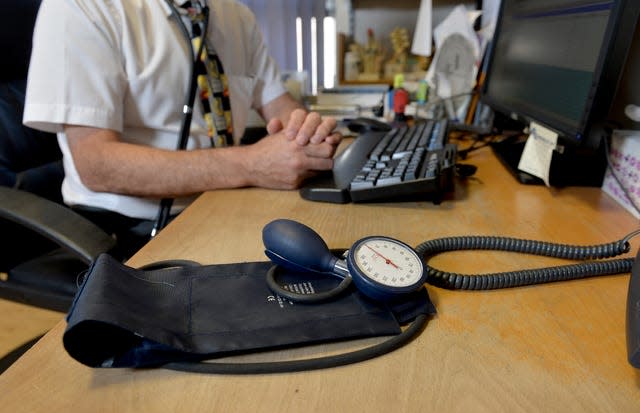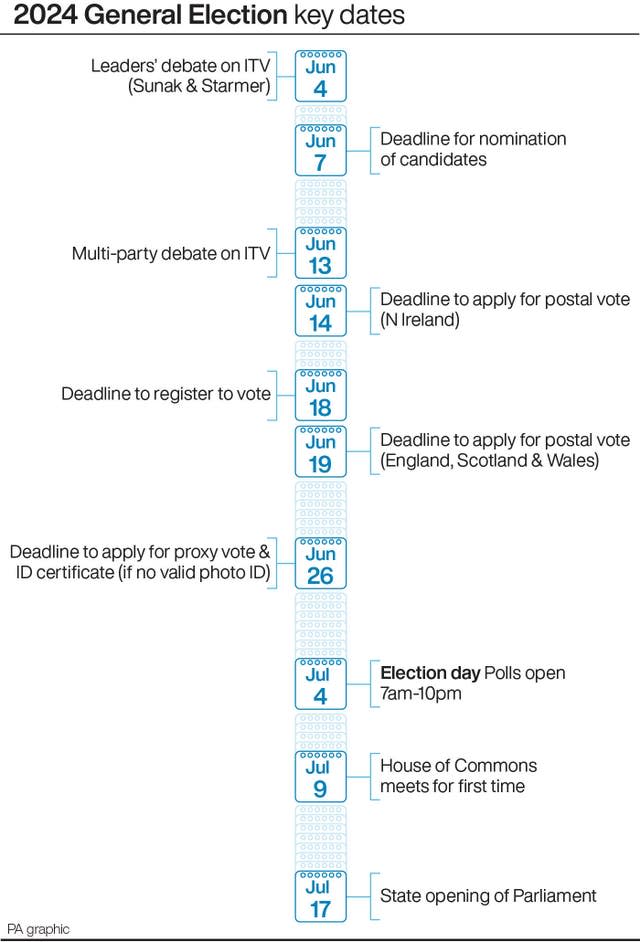What is the Conservative Party’s first General Election health campaign offer?
Health Secretary Victoria Atkins has been promoting the Conservatives’ bid to boost community care, insisting it is part of reforms to make the NHS “faster, simpler and fairer”.
The party’s first major health offer of the General Election campaign would be funded by slashing the number of NHS managers.

Here, the PA news agency takes a look at the proposal.
– What is the Conservatives’ plan?
It has three strands to it. The first is to expand Pharmacy First, which was launched in England in January and allows patients to be treated for seven common conditions at their local pharmacy without the need for a GP appointment or prescription.
The Conservatives said the expansion would offer women more contraceptive options, deliver menopause support, and provide treatment for more conditions, such as acne and chest infections.
The second strand involves building 100 new GP surgeries and modernising 150 more, particularly in those areas experiencing new housing developments.
The final part is to build 50 new community diagnostic centres.
– What will the impact of the policy be?
The Conservatives hope the changes will make it easier for people to see a GP when they need to.
They believe the expanded Pharmacy First scheme, once fully scaled, will free up 20 million GP appointments in total.
Challenged on when this will happen, Ms Atkins put a five-year time frame on it when she told Sunday Morning With Trevor Phillips on Sky News: “By the end of the next parliament.”
In April, a survey by NHS England and the Office for National Statistics (ONS) found one in 20 people who call their GP for help are told to call back on another day as the GP practice was unable to help that day.
Figures for February showed that GP teams in England delivered 30 million appointments in February – up from 25 million pre-pandemic.
– How has Pharmacy First performed since its launch?
Speaking in April, health minister Dame Andrea Leadsom told the Commons: “Some 98% of community pharmacies have signed up to the Pharmacy First offer, with over 125,000 consultations claimed in the first month.”
There are more than 10,000 community pharmacies in England.
The Commons Health and Social Care Committee, in a report published just hours before Parliament’s dissolution, warned the pharmacy sector is “creaking under the strain of funding pressures, medicine shortages and skill mix challenges”.
It urged the Government to tackle drugs shortages or risk the failure of Pharmacy First.
– What will the cost of the policy be?
The Conservatives believe the three strands, once scaled, will cost an additional £1.01 billion a year by 2029/30.
The party says it will pay for the additional expenditure by cutting back the number of NHS managers by 5,500, which it says will save £550 million each year by 2029/30.
It adds new controls on management consultancy spend in government are also estimated to save £640 million each year by 2029/30.
– What is the current state of services?
It remains to be seen how such a policy, combined with other Conservative policies to tackle the backlogs, would help given the current level of services on offer.
The National Pharmacy Association (NPA) said that between January and the end of April this year, some 177 pharmacies closed across England.
Last year there were 403 pharmacy closures across the country – compared with 91 in 2022, according to analysis of official NHS data by the NPA, which represents independent community pharmacies in the UK.
– What has been the reaction to the proposal?
Labour’s shadow health secretary Wes Streeting said the Conservatives have cut 1,700 GPs since 2016, adding: “Patients are finding it harder than ever before to see a GP, so why would they trust this latest empty promise?”

If it wins the General Election, Labour has said it will initially focus on reducing treatment backlogs, which currently stand at 7.54 million.
Labour has vowed to create an additional 40,000 appointments, scans and operations each week during evenings and weekends.
It would also double the numbers of scanners in a bid to diagnose patients earlier.
The Liberal Democrats launched their campaign bus last month with a “save the NHS” message, indicating their thoughts on how the health service is coping.
Professor Kamila Hawthorne, who chairs the Royal College of GPs, said of the Conservative Party’s proposal: “GP infrastructure is letting patients down, and it is good to see commitments to improving it.”
She added there also needs to be investment in recruiting and retaining more GPs, adding: “The average number of patients per fully qualified GP is now 2,294, meaning each GP is, on average, responsible for 154 more patients than there were five years ago.
“We are delivering millions more appointments than we were five years ago, with 880 fewer fully qualified, full-time equivalent GPs, but we can’t keep doing more with less.”

 Yahoo News
Yahoo News 
